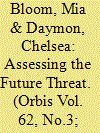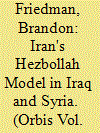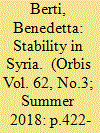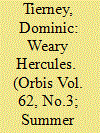|
|
|
Sort Order |
|
|
|
Items / Page
|
|
|
|
|
|
|
| Srl | Item |
| 1 |
ID:
162744


|
|
|
|
|
| Summary/Abstract |
This article argues that a reemerging Iraqi Arab nationalism offers a chance for Iraqis to combat sectarian politics. Sectarianism, which Iran as well as various Sunni and Shi‘i Islamists have promoted in Iraq since 2003, ultimately created the instability and malcontent out of which ISIS emerged. Now that ISIS has been defeated on the battlefield, stakeholders should look to consolidate their military victories by transforming them into real political gains. The best way to do so is to build institutions and promote political identity based on the notion of an Arab Iraq.
|
|
|
|
|
|
|
|
|
|
|
|
|
|
|
|
| 2 |
ID:
162742


|
|
|
|
|
| Summary/Abstract |
The Islamic State of Iraq and Syria's (ISIS) Virtual Caliphate shows no signs of diminishment. With the group's loss of territory and with social media platforms increasingly policed, Telegram, a messaging application, remains ISIS's key platform for disseminating propaganda and recruiting new members. Telegram's security features, cross-platform construction, and secret chat option offer a secure environment for interaction between ISIS and its supporters. On Telegram, ISIS manipulates an environment rich with addictive properties, creating online spaces that encourage group identity, shared opinions, and dominant ideologies, while exploiting an individual's need to be a part of the group. This research investigates how Telegram is used by ISIS and its supporters and assesses what kind of threat the use of Telegram poses for the future.
|
|
|
|
|
|
|
|
|
|
|
|
|
|
|
|
| 3 |
ID:
162748


|
|
|
|
|
| Summary/Abstract |
Kinetic operations—either overt, covert, or clandestine— should only be employed with ample forethought as to what they are intended to achieve and whether the costs are worth the benefits. Notwithstanding their advantages and disadvantages, the Islamic State in Iraq and Syria (ISIS) will not be defeated through kinetic operations alone. When linking tactical operations to the strategic goal of degrading a terrorist threat, post-conflict stabilization and rebuilding are often required to cement tactical victories into a desired and sustainable end state. Terrorism, including ISIS, is not an existential threat to the U.S. and requires a multi-layer approach that is not linear and should encompass locally derived goals. The U.S. government should envision kinetic operations as only one part of a broader strategy to stabilize Iraq and Syria after the collapse of ISIS, or it will continue to find itself in a perpetual war.
|
|
|
|
|
|
|
|
|
|
|
|
|
|
|
|
| 4 |
ID:
162743


|
|
|
|
|
| Summary/Abstract |
Iraq still faces the same economic challenges that contributed to the rise of al-Qaeda and the Islamic State. And unless these challenges are resolved, the likelihood of future political stability is low. The extremely high level of unemployment and underemployment among Iraq's youth, combined with massive corruption, is contributing to widespread poverty and radicalization. The Iraqi government's efforts to deal with these challenges are hamstrung by the expectation that current low oil prices will continue for a decade or more. These obstacles will constrain state-led development efforts severely. Iraq needs to execute successfully anti-corruption and pro-youth employment strategies that draw on the experience of other states, but are crafted to meet Iraq's unique conditions.
|
|
|
|
|
|
|
|
|
|
|
|
|
|
|
|
| 5 |
ID:
162746


|
|
|
|
|
| Summary/Abstract |
This essay argues the wars in Iraq and Syria are not over. Iran has used the war against the Islamic State, and, more generally, the instability in Iraq and Syria, to successfully spread and legitimize its influence. If the U.S. intends to challenge Iran's influence in Syria and Iraq, it needs to demonstrate its long-term commitment to its local partners, and it needs to work with its partners to secure and stabilize eastern Syria and western Iraq. Countering Iran's influence in Iraq and Syria is a long-term project, and creating viable alternatives to Iranian influence in Damascus and Baghdad is the best way to prevent them from becoming long-term Iranian dependencies.
|
|
|
|
|
|
|
|
|
|
|
|
|
|
|
|
| 6 |
ID:
162741


|
|
|
|
|
| Summary/Abstract |
This article examines the current state of the global jihad movement and offers reflections on its likely trajectory in the foreseeable future. It concludes that while the global jihad temporarily has been set back by the relative decline of the Islamic State, the movement overall benefits from al-Qaeda's regeneration; its ongoing ideological appeal; and its structural decentralization. In the next years, the movement likely will continue to evolve from its current bipolar structure toward an increasingly multipolar entity. Furthermore, it argues that the future jihadi movement will contain a large number of jihadi actors whose relationships will span cooperative, competitive, or mixed engagements, with implications for the movement as a whole. The article highlights several challenges for counterterrorism, including dealing with a complex movement structure; radicalization; socio-political disenfranchisement; the counter-response of societies targeted by jihadist violence; and technological changes. The article concludes with an assessment that in the next two to five years, the global jihad will remain a potent, although not an existential, threat.
|
|
|
|
|
|
|
|
|
|
|
|
|
|
|
|
| 7 |
ID:
162747


|
|
|
|
|
| Summary/Abstract |
Though a vast coalition of some 75 countries has retaken much of the territory once comprising ISIS's Caliphate, the threat to the Fertile Crescent is far from over. Saudi Arabia, the United Arab Emirates, and a number of the other Gulf States represent a few of the many regional and global stakeholders currently engaged in this arena in the name of stability and other more personal interests. This article will explore the motivations, capabilities, and activities of the Gulf States vis-à-vis ISIS, the Fertile Crescent, and the larger threat that groups like ISIS represent more broadly.
|
|
|
|
|
|
|
|
|
|
|
|
|
|
|
|
| 8 |
ID:
162745


|
|
|
|
|
| Summary/Abstract |
The Syrian Civil War has taken a devastating toll on the country's civilian infrastructure and population. Tackling the legacy of the conflict and restoring a measure of stability will constitute a monumental and generational challenge. The article addresses the “day after” in Syria by mapping out the main issues that a future post-conflict recovery, reconstruction, and reconciliation process would need to address in order to attain some level of stability and to be sustainable. It then describes and analyzes one of the most complex challenges of a future post-war transition, namely the need to reign in the proliferation of non-state armed groups and to ensure a process of disarmament, demobilization, and reintegration (DDR) of former combatants, including those hailing from the jihadi camp. Finally, the article briefly addresses the role that local actors can play in beginning to build stability.
|
|
|
|
|
|
|
|
|
|
|
|
|
|
|
|
| 9 |
ID:
162749


|
|
|
|
|
| Summary/Abstract |
Since the 9/11 attacks, the United States has tended to engage in regime change missions with a short-term and improvisational approach that focuses on removing adversaries from the battlefield rather than achieving consolidated political gains. Today, Washington may repeat the same mistake by prioritizing the military destruction of ISIS, rather than creating a tolerable political order. The policy challenges are particularly acute because, like a weary Hercules, Washington is confronted with endless labor, but limited capability. The answer is to pursue a long-term strategic approach that aligns the ends and means of war, seeks ugly stability rather than illusory goals, accepts that nation-building in some form is inevitable, and wins the narrative war.
|
|
|
|
|
|
|
|
|
|
|
|
|
|
|
|
|
|
|
|
|